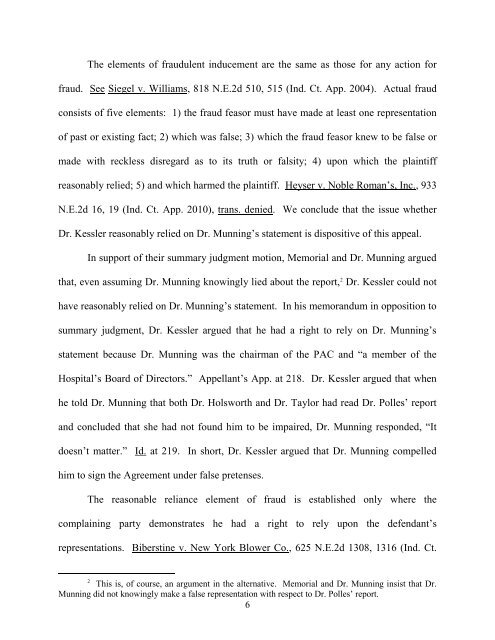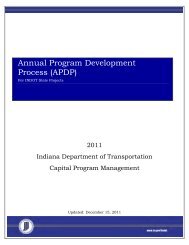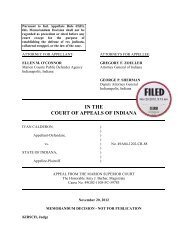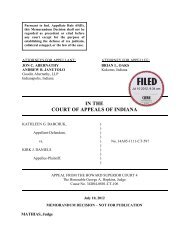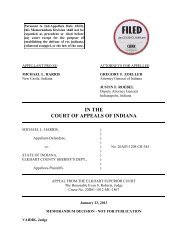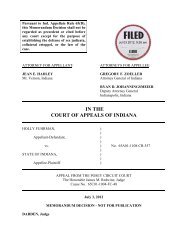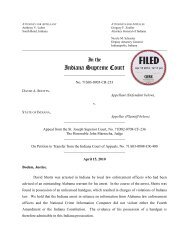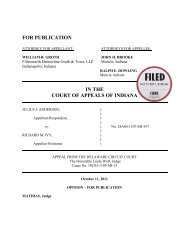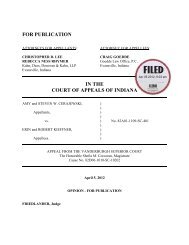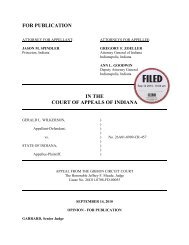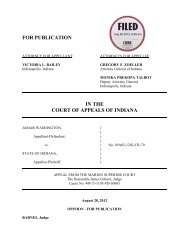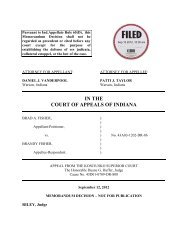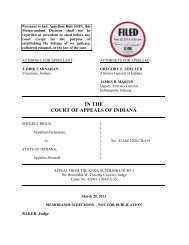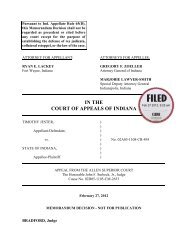Dr. Kurt Kessler, M.D. v. Memorial Hospital and ... - State of Indiana
Dr. Kurt Kessler, M.D. v. Memorial Hospital and ... - State of Indiana
Dr. Kurt Kessler, M.D. v. Memorial Hospital and ... - State of Indiana
You also want an ePaper? Increase the reach of your titles
YUMPU automatically turns print PDFs into web optimized ePapers that Google loves.
The elements <strong>of</strong> fraudulent inducement are the same as those for any action for<br />
fraud. See Siegel v. Williams, 818 N.E.2d 510, 515 (Ind. Ct. App. 2004). Actual fraud<br />
consists <strong>of</strong> five elements: 1) the fraud feasor must have made at least one representation<br />
<strong>of</strong> past or existing fact; 2) which was false; 3) which the fraud feasor knew to be false or<br />
made with reckless disregard as to its truth or falsity; 4) upon which the plaintiff<br />
reasonably relied; 5) <strong>and</strong> which harmed the plaintiff. Heyser v. Noble Roman’s, Inc., 933<br />
N.E.2d 16, 19 (Ind. Ct. App. 2010), trans. denied. We conclude that the issue whether<br />
<strong>Dr</strong>. <strong>Kessler</strong> reasonably relied on <strong>Dr</strong>. Munning’s statement is dispositive <strong>of</strong> this appeal.<br />
In support <strong>of</strong> their summary judgment motion, <strong>Memorial</strong> <strong>and</strong> <strong>Dr</strong>. Munning argued<br />
that, even assuming <strong>Dr</strong>. Munning knowingly lied about the report, 2 <strong>Dr</strong>. <strong>Kessler</strong> could not<br />
have reasonably relied on <strong>Dr</strong>. Munning’s statement. In his memor<strong>and</strong>um in opposition to<br />
summary judgment, <strong>Dr</strong>. <strong>Kessler</strong> argued that he had a right to rely on <strong>Dr</strong>. Munning’s<br />
statement because <strong>Dr</strong>. Munning was the chairman <strong>of</strong> the PAC <strong>and</strong> “a member <strong>of</strong> the<br />
<strong>Hospital</strong>’s Board <strong>of</strong> Directors.” Appellant’s App. at 218. <strong>Dr</strong>. <strong>Kessler</strong> argued that when<br />
he told <strong>Dr</strong>. Munning that both <strong>Dr</strong>. Holsworth <strong>and</strong> <strong>Dr</strong>. Taylor had read <strong>Dr</strong>. Polles’ report<br />
<strong>and</strong> concluded that she had not found him to be impaired, <strong>Dr</strong>. Munning responded, “It<br />
doesn’t matter.” Id. at 219. In short, <strong>Dr</strong>. <strong>Kessler</strong> argued that <strong>Dr</strong>. Munning compelled<br />
him to sign the Agreement under false pretenses.<br />
The reasonable reliance element <strong>of</strong> fraud is established only where the<br />
complaining party demonstrates he had a right to rely upon the defendant’s<br />
representations. Biberstine v. New York Blower Co., 625 N.E.2d 1308, 1316 (Ind. Ct.<br />
2<br />
This is, <strong>of</strong> course, an argument in the alternative. <strong>Memorial</strong> <strong>and</strong> <strong>Dr</strong>. Munning insist that <strong>Dr</strong>.<br />
Munning did not knowingly make a false representation with respect to <strong>Dr</strong>. Polles’ report.<br />
6


